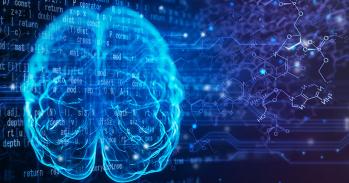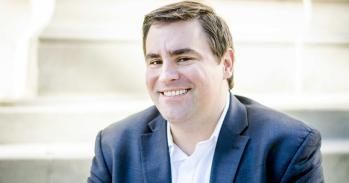
The Vice Chancellor of the University of Cambridge is to lead a delegation of academics to the annual meeting of the World Economic Forum at Davos, Switzerland, in January 2016, to explore issues including carbon reduction technologies and how science and engineering can best address society's greatest challenges.
The Vice Chancellor of the University of Cambridge is to lead a delegation of academics to the annual meeting of the World Economic Forum at Davos, Switzerland, in January 2016, to explore issues including carbon reduction technologies and how science and engineering can best address society's greatest challenges.
The University will host an IdeasLab looking at how breakthroughs in carbon reduction technologies will transform industries. IdeasLabs are quick-fire visual presentations followed by workgroup discussion, and have proved a successful format for engaging various communities in academic thinking.
Carbon Reduction Technologies: The University of Cambridge IdeasLab
Wednesday 20 January 16:15 - 17:30
Sir Leszek Borysiewicz, Vice-Chancellor, will introduce this event, which will look at how research by Cambridge academics has led to breakthroughs in carbon reduction technologies that will transform a range of industries. Ideas to be discussed include:
- Decarbonizing industrial-scale processes using virtual avatars
- Self-healing concrete for low-carbon infrastructure
- Improving solar materials efficiency using quantum mechanics
- Quantum materials for zero-loss transmission of electricity
The event is supported Energy@Cambridge, a Strategic Research Initiative that brings together the activities of over 250 world-leading academics working in all aspects of energy-related research, covering energy supply, conversion and demand, across a wide range from departments.
The speakers, all members of the Strategic Research Initiative, are:
Professor Abir Al-Tabbaa, Department of Engineering
Professor Al-Tabbaa is a Director of the Centre for Doctoral Training in Future Infrastructure and Built Environment. She leads international work on sustainable and innovative materials for construction and the environment. Her particular expertise relates to low-carbon and self-healing construction materials, ground improvement, soil mix technology and contaminated land remediation.
See also:
- Health-conscious concrete
- UK and China Collaboration on Sustainable Materials for Infrastructure
- Cleaning up contaminated land
Professor Sir Richard Friend, Department of Physics
Professor Friend is the Director of the Maxwell Centre and the Winton Fund for the Physics of Sustainability. He is the lead academic on one of Energy@Cambridge’s Grand Challenges – Materials for Energy Efficient Information Communications Technology.
Professor Friend’s research encompasses the physics, materials science and engineering of semiconductor devices made with carbon-based semiconductors, particularly polymers. His research group was first to demonstrate using polymers efficient operation of field-effect transistors and light-emitting diodes. These advances revealed that the semiconductor properties of this broad class of materials are unexpectedly clean, so that semiconductor devices can both reveal their novel semiconductor physics, including their operation in efficient photovoltaic diodes, optically-pumped lasing, directly-printed polymer transistor circuits and light-emitting transistors.
See also:
- Organic solar cells
- Inspired by nature
- Revolutionary solar cells double as lasers
- Light in, light out: the ‘rock’ that breaks the rules
- LEDs made from ‘wonder material’ perovskite
- Mirage maker
Professor Markus Kraft, Department of Chemical Engineering and Biotechnology
Professor Kraft is the director of the Singapore-Cambridge CREATE Research Centre and a principal investigator of the Cambridge Centre for Carbon Reduction in Chemical Technology (C4T), one of the Grand Challenges. C4T is a world-leading partnership between Cambridge and Singapore, set up to tackle the environmentally relevant and complex problem of assessing and reducing the carbon footprint of the integrated petro-chemical plants and electrical network on Jurong Island in Singapore.
Professor Kraft has contributed to the detailed modelling of combustion synthesis of organic and inorganic nanoparticles. He has worked on fluidization, spray drying and granulation of fine powders. His interested include computational modelling and optimization targeted towards developing carbon abatement and emissions reduction technologies.
Dr Suchitra Sebastian, Department of Physics
Dr Sebastian creates and studies interesting quantum materials - often under extreme conditions such as very high magnetic and electric fields, enormous pressures, and very low temperatures - with a view to discovering unusual phases of matter. Among these are the family of superconductors - which have the exciting property of transporting electricity with no energy loss - and hence hold great promise for energy saving applications. One of her research programmes is to create a new generation of superconductors that operate at accessible temperatures, thus providing energy transmission and storage solutions of the future.
See also:
Energy@Cambridge is working to develop new technologies to reduce the carbon footprint of industrial processes, energy generation and transmission, and building construction. Its aims include leveraging the University’s expertise to tackle grand technical and intellectual challenges in energy, integrating science, technology and policy research.
The initiative has four Grand Challenges, focused on developing and delivering new large-scale collaborative activities, facilities, centres and research directions by bringing together academics and external partners to work on future energy challenges where we believe we can make a significant impact.
Will Science Save Us?
Friday 22 January
The Vice Chancellor and Dr Suchitra Sebastian will take part in a lunchtime discussion entitled Will Science Save Us?, which will look at how we accelerate scientific breakthroughs that address society's greatest challenges.
* * *
The World Economic Forum is an independent international organisation engaging business, political, academic and other leaders of society to shape global, regional and industry agendas; this year’s theme is The Reshaping of the World: Consequences for Society, Politics and Business.
The Forum will provide an opportunity for the Cambridge researchers to engage with decision-makers in business, NGOs and in public policy, and to highlight new ideas from Cambridge in responding to global challenges.
For further information or to contact any of the speakers, please contact the team at Energy@Cambridge.

The text in this work is licensed under a Creative Commons Attribution 4.0 International License. For image use please see separate credits above.




